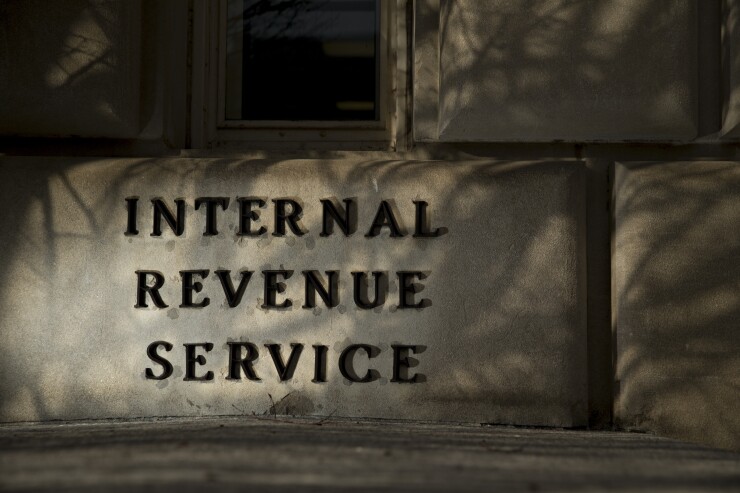Trump’s tax plans could diminish municipal tax exemptions
5 min read
Enjoy complimentary access to top ideas and insights — selected by our editors.
President-elect Donald Trump’s return to the White House has placed public finance leaders on the defensive, as tax policy changes may impact the industry’s investor base, increase borrowing costs and stymie certain infrastructure finance opportunities. Looking to the past offers some insight into how the coming months may play out.
Republicans last controlled all three branches of the federal government in 2016, which led to the enactment of the Tax Cuts and Jobs Act the following year. The TCJA axed tax-exempt advance refundings and the state and local tax deduction (SALT). It also nearly killed tax-exempt private-activity bonds.
Matt Fabian, partner at Municipal Markets Analytics Inc., told The Bond Buyer’s
“The muni lobby has improved the data that they have, they have improved the arguments for preserving the [tax] exemption and I think they’ve been preparing for this potential scenario for months,” Fabian said. “So if [the tax exemption] can be defended, they’ll do it.”
Industry groups like the Bond Dealers of America are increasing their focus on several legislative policies aimed at strengthening the muni market.
“Congress has been afforded the chance to reevaluate policy decisions made in 2017, and we urge them to further embolden Americas’ infrastructure by promoting municipal bonds, reinstating tax-exempt advance refundings, raising the bank-qualified limit, and exploring options to further utilize and expand private activity bonds,” Brett Bolton, senior vice president at the Bond Dealers of America, said in an interview with The Bond Buyer’s
Read more:
Market leaders are looking for silver linings in the meantime.
In late November, Trump
“Scott Bessent is a great pick because he knows markets,” Chris Iacovella, president and CEO of the American Securities Association, said in an interview with The Bond Buyer’s
Read on to dive into expert predictions of Trump’s impact on the markets and how leaders are preparing for changes in every direction.

Protection of tax-exempt bonds is top issue for public finance leaders
As public finance leaders continue to navigate uncertain waters in the markets, professionals are mindful of protecting the tax exemption and further promoting municipal bonds.
The Tax Cuts and Jobs Act of 2017 and the numerous provisions included in it that are set to expire later this year mean bond advocates are once again doubling down on “preserving and protecting all tax-exempt bonds during any attempt at tax reform,” Toby Rittner, president and CEO of the Council of Development Finance Agencies, said in an interview with The Bond Buyer’s
Industry associations like the Bond Dealers of America and the CDFA are also pushing to enact changes in the Farm Bill and the strength of the State Small Business Credit Initiative to better support developing rural communities.
Read more:

Win McNamee/Photographer: Win McNamee/Getty
Does a Trump return mean a doubled SALT cap?
Industry experts are cautiously optimistic that comments President-elect Trump made during the campaign will yield positive changes for the state and local tax deduction.
“Whether or not the cap is completely lifted, I’m skeptical about that, but at a minimum I think doubling it for married filing joint taxpayers might be a logical approach,” Mary Burke Baker, governmental affairs counsel for K&L Gates, said during a post-election recap discussion last month. “President-elect Trump campaigned on that, and as we know, it’s a pivotal issue for a lot of Republicans in high-tax states, not to mention for Democrats.”
Experts also opined on the future of agencies like the Department of Transportation, and how the impact of industry figures such as Tesla CEO Elon Musk could shape Trump’s view of future transportation priorities.
Read more:

Municipal bonds see widespread support from California voters
Following the success of two noteworthy
Last month’s ballot featured 266 school bond measures seeking to clear the 55% voter approval hurdle, a record number of local bond measures in the state’s history.
Proposition 2, Bonds for Public School and College Facilities, garnered support from 58.7% of voters, while Proposition 4, Bonds for Water, Wildfire and Climate Risks, received 59.8% in affirmative support, according to the
Read more:

Andrew Harrer/Bloomberg
Cutting IRS funding could hamper bond auditing
Industry experts say the tug-of-war between Republicans and the Internal Revenue Service over the agency’s budget might affect the number of audits posed on municipal issuers.
The IRS’ original $80 billion boost from the Inflation Reduction Act of 2022 has already been knocked down by $20 billion through
Rich Moore, a partner at Orrick, highlighted the correlation between the size of the IRS’ budget and the number of audits that can be conducted.
“A higher budget means more agents and more agents mean more examinations,” Moore said in an interview with The Bond Buyer’s
Read more:

Sean Rayford/Photographer: Sean Rayford/Getty
Columbus-area tax measure backing bonds gets green light from voters
More than 56% of voters approved a sales tax proposal for the Central Ohio Transit Authority service area last month, increasing the 0.5% tax to 1% and bringing the levy up to 8% from 7.5%.
Erin Delffs, chief financial officer at COTA, said in an interview with The Bond Buyer that the authority will plan to issue up to $500 million of sales tax revenue bonds between 2025 and 2050 as part of a framework for enhancing the transit network in Franklin County. The first series of bonds is expected to be issued in the third or fourth quarter of next year.
“This is a pivotal moment for COTA and the entire Central Ohio region,” Monica Téllez-Fowler, president and CEO of COTA, said in a statement. “With the passage of Issue 47, we are empowered to make significant investments in our transit system that will improve access, equity, and sustainability for everyone.”
Read more:







